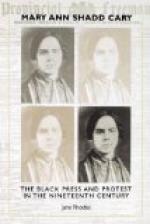We go to church like we do everything else, two by two. Start at a tap of that same old bell, and march along like wooden figures wound up; and the people who see us don’t think we are really truly children or like theirs, except in shape inside. They think we just love our hideous clothes, and that we ought to be thankful for molasses and bread-and-milk every night in the week but one, and if we’re not, we’re wicked. Rich people think queer things.
Sundays at the Humane are terribly religious.
They begin early and last until after supper, and if anybody is sorry when Sunday is over, it’s never been mentioned out loud. We have prayers and Bible-reading before breakfast every day, but on Sundays longer. Then we go to Sunday-school, where some of the children stare at us like we were foreign heathen who have come to get saved. Some nudge each other and laugh. But real many are nice and sweet, and I just love that little Minnie Dawes, who sits in front of me. She wears the prettiest hats in Yorkburg, and I get lots of ideas from them. I trim hats in my mind all the time Miss Sallie is talking—Miss Sallie is our teacher.
She is a good lady, Miss Sallie Ray is. Her chief occupation is religion, and as for going to church, it’s the true joy of her life. She’s in love with Mr. Benson, the Superintendent, and very regular at all the services. So is he.
But for teaching children Miss Sallie wasn’t meant. She really wasn’t. She never surely knows the lesson herself, and it was such fun asking her all sorts of questions just to see her flounder round for answers that I used to pretend I wanted to know a lot of things I didn’t. But I don’t do that now. It was like punching a lame cat to see it hop, and I stopped.
She don’t ask me anything, either. Never has since the day Mr. Benson came in our class and asked for a little review, and Martha Cary made trouble, of course.
Miss Sallie was so red and excited by Mr. Benson sitting there beside her that she didn’t know what she was doing. She didn’t, or she wouldn’t have asked me questions, knowing I never say the things I ought. But after a minute she did ask me, fanning just as hard as she could. It was in January.
“Now, Mary Cary, tell us something of the people we have been studying about this winter,” she said, “Mention something of Abraham, Isaac, and Jacob, and Peter and Paul. Who was Abraham?”
“Abraham was a coward,” I said.
“A what?” And her voice was a little shriek. “A what?”
“A coward. He was! He passed his wife off for his sister, fearing trouble for himself, and not thinking of consequences for her.”
“That will do,” she said, and she fanned harder than ever, and looked real frightened at Mr. Benson, who was blowing his nose. “Susie Rice, who was Jacob?”
Susie didn’t know. Nobody knew, so I spoke again.
“Jacob was a rascal. He deceived his father and stole from his brother. But he prospered and repented, and died prominent.”




